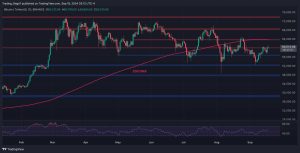The State Power Company of China, in the district of Lanzhou has announced that it will be creating a cryptocurrency taskforce that will carry out inspections of cryptocurrency mining.
An article published on the company website, described how crypto mining businesses will be required to sign a commitment letter in which they pledge to not carry out any crypto-related activities.
The article noted:
“In order to conscientiously implement the requirements of government departments on energy consumption dual control measures during the “14th Five-Year Plan”, on September 9th, Lanzhou New Area Company organized a strong team to actively cooperate with the Gansu Energy Inspection Office, the Department of Industry and Information Technology, and the Development and Reform Commission to carry out Bitcoin, etc. Special inspection actions for virtual currency “mining” activities”
Part of the reasoning included in the published post behind the regional crypto crackdown is that Bitcoin and other virtual currencies are unsustainable, noting that they include the “waste of energy and evasion of financial supervision”.
The article ended by alluding to future checks and investigations by the company:
“The Lanzhou New Area Company will continue to thoroughly investigate potential “mining” customers such as Internet cafes, Internet companies, and sudden increase in power consumption within its jurisdiction, and carry out normalized inspections of virtual currency mining machines for “mining”, breach of contract power consumption, and power theft.”
China’s crypto crackdown has increased in its intensity, with the deputy director of the Bureau of Financial Consumer Rights Protection of the People’s Bank of China, recently reminding chinese citizens of the following:
“We once again remind the general public that bitcoin and other virtual currencies are not legal tender and have no actual value support. The people should enhance their risk awareness, consciously stay away from cryptocurrencies and protect their investments.”
Disclaimer: This article is provided for informational purposes only. It is not offered or intended to be used as legal, tax, investment, financial, or other advice.




















